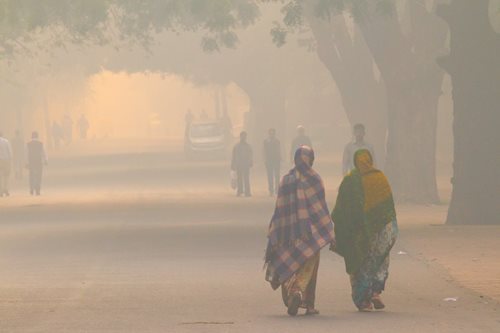Outdoor air pollution is a major public health issue, contributing to chronic diseases, increased hospitalization, and premature mortality. The World Health Organization estimates that about 3 million deaths per year are linked to exposure to outdoor air pollution. Nearly 95% of these deaths are due to noncommunicable diseases such as cardiovascular diseases, strokes, chronic pulmonary diseases and cancers.
In the News
India’s capital, New Delhi, has been under scrutinity for its record high smog, choking the city and its residents for the last few weeks. The smog was so severe that United Airlines temporarily canceled its Newark – New Delhi flights before resuming service a couple of days later. Travel agencies are also reporting cancellations of trips for the holiday season. While experts estimate that breathing in New Delhi for a day equals smoking about 50 cigarettes, hospitals have reported a 20% surge in patients admitted for pollution-related illness.

As of today, the air quality index (AQI) is at 249 – far below the 624-peak reported on November 8 but still much higher than the upper limit of “good” quality air at 50.
Other cities that are known for poor air quality include Lagos (Nigeria), Beijing (China), Karachi (Pakistan), Kolkata (India) and Los Angeles (USA). Paris (France) and London (UK) usually also get periodical smog, especially in the summer.
Look up your destination’s live air quality by visiting https://air.plumelabs.com/en/.
Planning Your Trip
When planning for a trip, consider the following factors to help you alleviate the effect of air pollution.
- Pre-Existing Health Condition: Do you have asthma, allergies, chronic pulmonary infections, or heart disease?
- Age: Elderly and young children are more susceptible to air pollution because of pre-existing conditions and because young children take in more air than adults for their body weight.
- Destination: Are you traveling to an urban or rural area? How often does it rain?
- Length of your stay: Long-term exposure to pollution will have a greater impact on your health.
- Season: What season are you traveling? Will there be a lot of pollen? Smog tends to occur during hot and humid times of the year.
Travel Tips
Although travelers may not be affected by air pollution in the long run, some may temporarily suffer from shortness of breath, worsening of asthma and allergy symptoms, coughing, and throat or chest irritations. Global Travel Plus shares tips to mitigate the effect of air pollution when traveling:
- While it may not be convenient as a traveler, follow alerts to stay indoors during high smog days.
- No matter how healthy you are, avoid high physical activities during high smog days.
- If you have asthma or suffer from Chronic Obstructive Pulmonary disease (COPD), consult your doctor prior to your trip. Travel with an inhaler, antibiotics or oral steroid as recommended by your doctor.
- Depending on your destination and how severe the air pollution is, consider traveling with a breathing mask.
- Install a pollution tracker app on your smartphone. Our favorite one is the Plume Air Report app for iPhone and Android. The app will give you live and forecast smog reports for any city on earth.
If you are traveling to highly polluted areas and feel ill, visit a local doctor. Remember Global Travel Plus is here to ensure you get the best care and can assist you in finding the best doctor or healthcare facility near you. View the full list of our services on our Global Travel Plus website.